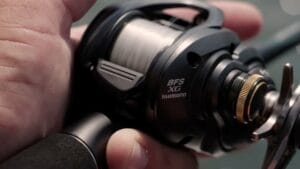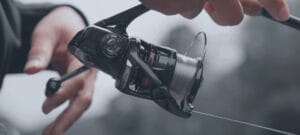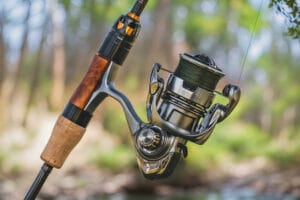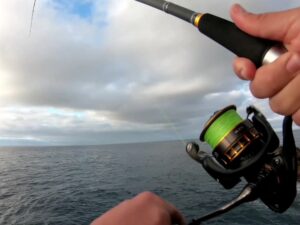Tips
Guide To Bass Fishing In The Winter
Just because it’s winter, doesn’t mean you have to hibernate your favorite pastime. Bundle up, because it’s time to go catch some fish!
Don't Give Up On Winter Fishing For Bass
I heard it again today. There’s no doubt. The noise is all around us. The thumping, throbbing, roaring, squeaking sounds of bass boats being pulled out of the water, covered, and put into hibernation for the winter season.
The thoughts that get me are, why do so many people give up so easily in the winter?
I think the answer is really quite simple. Many people don’t know that they can.
I have some very good news for you. You don’t have to give up. You don’t have to put your equipment away for the winter, and you don’t have to go home.
If you want to stay in the game year-round, it does take a bit more work than just fishing in the prime seasons. There are many options to keep you fishing, catching and harvesting bass year-round.
Will you be a hibernating bass fisherman or a persistent bass angler?
How Bass React In Different Water Temperatures
If you’re going to be fishing for bass in the winter, you’re going to have to understand the effect the weather has on your fish.
After all, it’s one of the most important factors that determines whether you have a good catch or not.
Below are the symptoms various species of bass like, striped bass, smallmouth, largemouth bass, etc. exhibit based on the temperature of the water.
40° or Below
- Bass will be sluggish and inactive.
- Bass won’t be actively feeding.
- Will be in areas that are least affected by the cold.
- Bass will be inactive and very slow to respond to most stimuli.
40° to 50°
- Bass will be slow.
- They will have a short window of active feeding time during the day when the water is warmest.
- Outside of that window, bass will not be actively feeding.
- Bass will be in areas that are least affected by the cold temperatures throughout most of the day.
50° and above
- Above 50° bass will start becoming very active and start actively feeding.
- They will be in areas that are exposed to the sun or are in warmer water.
- They will be moving faster and will be more likely to respond to your bait.
While it’s clear that in the coldest days, bass will not be active, if you watch them long enough you’ll find that they still show some signs of life.
In fact, these are the times that you may catch that trophy big bass.
It will require patience and a lot of trial and error to figure out what is going to work at the time.
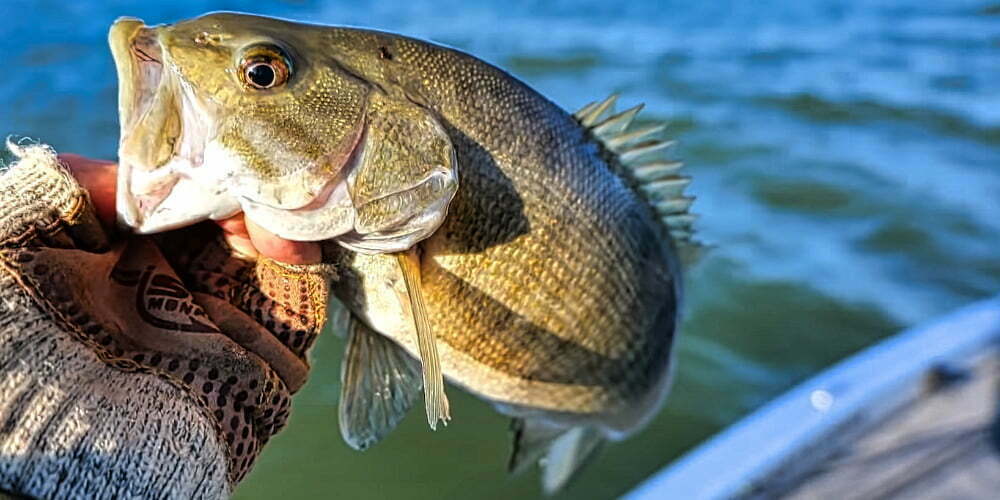
What You Need for Bass Fishing in Cold Weather
The first thing you need to do is make sure you have the right clothing for bass fishing in cold weather.
It’s not so much about your outer clothing as it is about your gloves and boots or shoes. When the temperature starts to drop, the first parts of your body to get cold are your hands and feet. Which means these are two of the most important areas to focus on.
Wear waterproof boots. I like to wear a thin layer of cotton under my waders and then wear waterproof boots over the top.
Wear insulated gloves. When trying to detect a hit on your bait, you need to be able to feel your line. I wear gloves that are thin enough to use my rod but warm enough to keep my hands warm.
If I’m able to, I will bring a portable heater with me. Some people might be too manly for that, but I’m not. I hate being extremely cold and having a heater next to me really helps take the bite off.
Once you’ve gotten your apparel in order, it’s time to start catching some bass.
Winter bass fishing has to be approached differently than the rest of the seasons.
Bass are going to be slow to move and respond. They are trying to save their energy. Despite this, they still have to eat, and aren’t going to pass up an easy meal that swims up next to them.
So keep this in mind as we look over the 7 tips for catching bass in the winter months.
7 Winter Bass Fishing Tips
Winter fishing is a slightly different ball game than the rest of the fishing season. In order to have success during the winter, you have to take a different approach and employ different techniques.
Here are 7 tips that will help you catch more winter bass.
1. Use the Right Types Of Bait and Lure...Go Small
This is the first tip and probably the most important one. You’re going to have to be very picky with the types of bait you use and the size.
Bass aren’t going to be in the mood to chase down your bait. They are going to want it to come to them. Even if they are hungry they may not want to risk any effort to eat if there’s a chance they’ll be wasting energy.
Some of the best types of live bait will be small worms and shad.
For lures, you’ll want to opt for small jigs, blade baits, and spoons.
You can also have really good success using a finesse type presentation setup on a drop shot, Texas rig, Carolina rig, or your preferred setup.
The main key here to remember is to go small.
You’ll be amazed at the size of bass you’ll pull in on a lure and bait that would never have worked in the spring months.
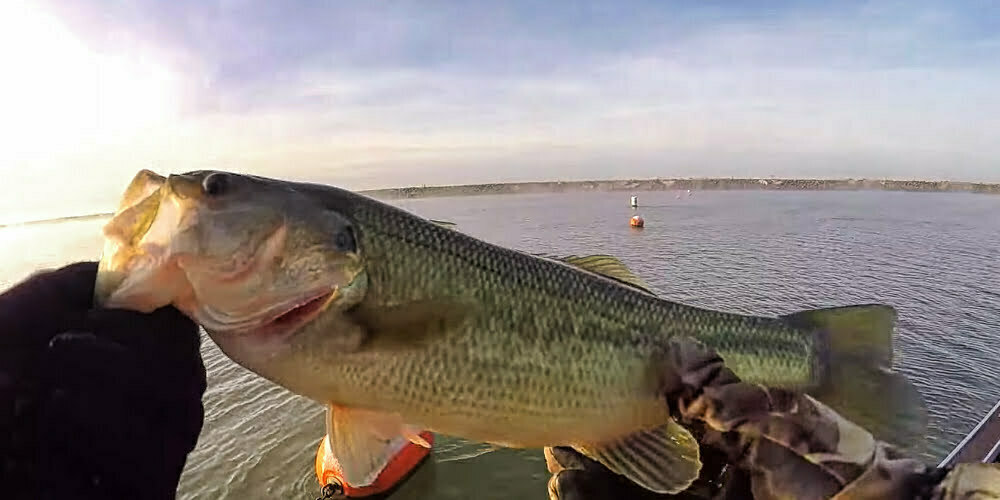
2. Slow Your Bait’s Movement
Bass are going to be slow at this time of year and are not going to be willing to put in much effort for food. You’re going to have to do most of the work for them.
This means you should use a slow, methodical retrieve.
I like to use a very slow reel, so the bait moves as little as possible. I will also make sure it’s on a fairly short line, so I can maintain a lot of control over it.
Take plenty of pauses with your bait to allow it to sink or just kind of hang around on the floor bottom.
You’ll find a drop shot very effective for lake fishing in the winter. Something about the bait just slowly making its way suspended in the water just looks like a great meal to any bass hanging near the bottom.
3. Choose A Neutral Color
You’ll want to put away the flashy color lures you were using throughout the rest of the year.
The colors you want to be using in the winter are going to be more neutral. Bass aren’t going to be in attack mode. They want to conserve energy.
Neutral colors like brown, green, and even black are going to be your best bet.
You can also try using two colors at once, like green and brown, to help you match the water better.
4. Keep Near the Shore in Rivers and Deep Pockets in Lakes
This tip is a particularly good one if you are fishing for smallmouth bass in a river.
The shoreline is going to be a good place to stand. This is because bass will be in the shallow water, trying to keep warm.
There’s also a good chance they will be in the tail out of the main current passing by. I find the best spots are in places where I can cast close to the bank, but still have a good amount of depth.
If you are fishing in a lake, you will want to focus on the deepest pockets.
Bass will move from shallow, cold water to deeper water in the winter.
Bass will be near the bottom of the lake when it’s cold, trying to conserve as much energy as possible. They will be staying in the areas that are warmest, which for most lakes, will be the deepest pockets of the water.
This is where you’ll want to look to find the bass.
How do you fish it?
One of the best methods is vertical jigging. You can start with a drop shot rig, but I prefer to use a Carolina Rig.
During the warmest part of the day, you can work deep weed edges, ledges, deep grass, and brush on the bottom.
Try using a vibrating jig or football jig and letting your lure sink down and just slowly drag it along the bottom, hitting everything along the way. This can trigger some reflex strikes.
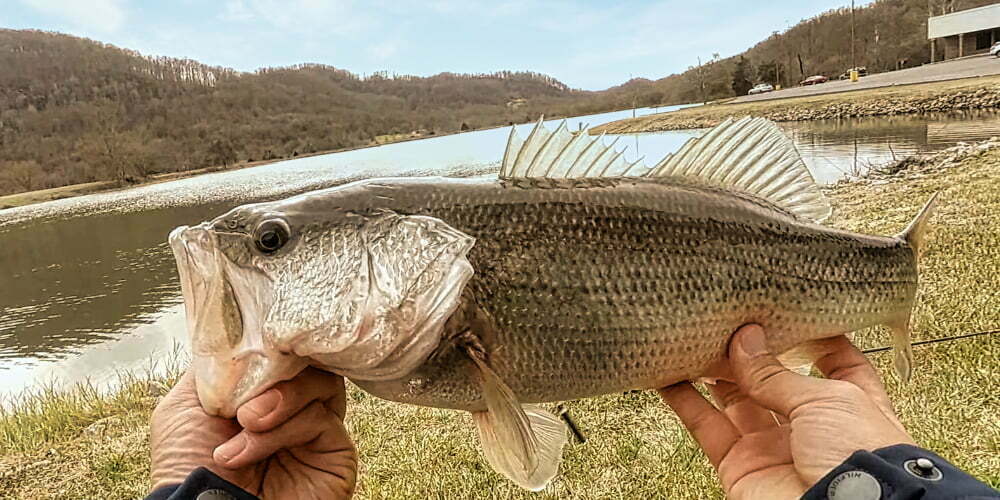
5. Best Time Of Day
In the winter, the best time of day is going to be during the afternoon after the water has been able to warm up slightly.
I’m not a huge fan of the morning hours. The fish are still sluggish and not moving as much.
After the sun has had a chance to warm the water temp a bit, the baitfish begin to move around and become more active.
This creates a few benefits for your bass fishing.
First, it makes them more likely to eat. The baitfish are an easier food source for bass than shad or worms as they are already closer to the top and easier to catch.
Second, it makes the bass more active. As the day progresses, the water temperature rises, and the fish become more and more active.
This is why the afternoon is best for the winter. The fish are a bit more active, and you’ll generally have a much better catch.
6. Use Your Electronics
We all know that electronics are a great tool for locating bass in the summer months, but during the winter they can be even more important.
Since bass are suspended in deep water and are lethargic, it can make it difficult to know whether you’re actually fishing near any or not.
If you don’t have a fish finder, just use your depth finder to locate deeper pockets and focus on those areas.
Better yet, upgrade to a fish finder and remove the question of whether they’re there or not entirely from the equation.
7. Don't Give Up
The winter bass may be harder to catch, but they are still there.
Remember, many of the same tactics you would use in the spring or summer will still work, just with winter time adjustments.
Locate deep pockets, especially those with underwater structure and extra cover.
Look for bass holding on an outside point or in the middle of a point.
Remember that bass still need to eat in the winter, but because they’re saving their energy they’re looking for easy meals.
Use small jigs and slowly work them through the area you’re fishing.
Have some patience and the bass will come.
FAQs
Yes, I believe it is worth it.
As long as you take the advice from this article and understand how the water temperature affects the fish, you’ll have some great opportunities to catch bass in the winter.
Not hard really, just different.
If you use the right bait and change your fishing style, you can have good success.
You just have to get yourself into a slower mindset.
Everything is going to take longer, and you just have to be okay with that.
If you’re expecting the same level of action, bites, and strikes as you’d get during the active months then you’ll end up being disappointed.
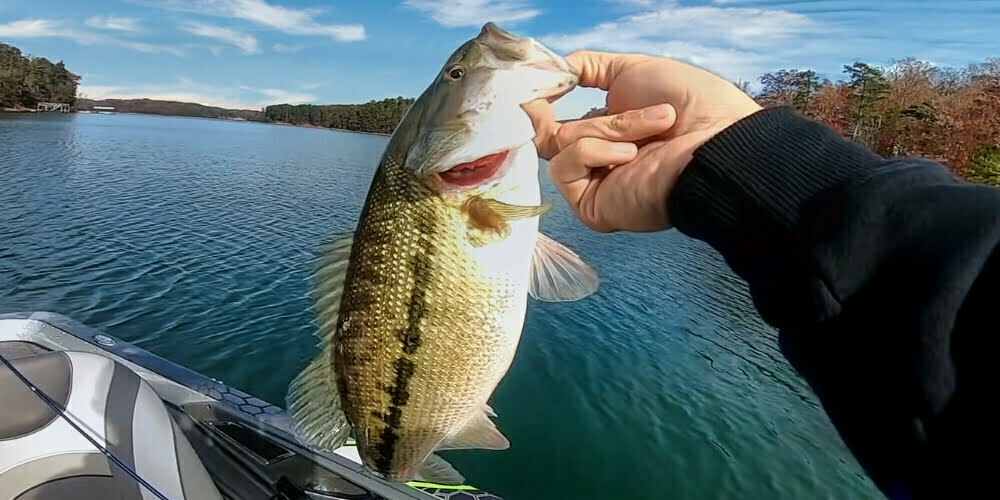
Conclusion:
Don’t let the cold weather keep you from fishing. Fishing in the winter is a great way to enjoy bass fishing when the lake/pond/river is quiet.
Keep in mind that many lakes aren’t affected by cold weather as much as others.
Check the weather and lake reports to find out if the lake you want to fish is not frozen over.
If it’s open, go fishing.
Once you have an understanding of how bass behave in the cold water, and you’ve modified your technique based on this understanding, you can have an awesome time bass fishing in the winter.
And if you’re a big cold baby like me, you can always take a trip to Florida and explore some of the bass heavens in the south.
As an Amazon Associate I earn from qualifying purchases.

